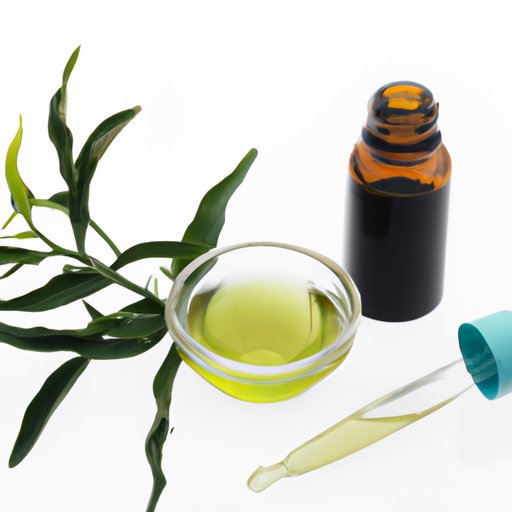Introduction
Tea tree oil is a popular essential oil derived from the leaves of the Melaleuca alternifolia, a native Australian plant. It has long been used as a natural remedy to treat a variety of ailments, including skin conditions. In recent years, tea tree oil has become increasingly popular in skin care products, touted as an effective and natural treatment for acne, inflammation, and other common skin issues.
What is Tea Tree Oil?
Tea tree oil is a powerful essential oil that is extracted from the leaves of the Melaleuca alternifolia plant. It has a distinct, camphor-like scent and can be found in many natural skin care products. It is known for its antiseptic, antibacterial, and anti-inflammatory properties, making it a popular choice for treating a range of skin conditions, including acne, eczema, psoriasis, and rosacea.
How Does Tea Tree Oil Benefit Skin Care?
Tea tree oil has numerous benefits for skin care. Its active ingredients, terpinen-4-ol and cineole, are responsible for its antimicrobial, anti-inflammatory, and antiseptic properties. These properties make tea tree oil a popular choice for treating skin conditions like acne, rosacea, and eczema. Here are some of the ways tea tree oil can benefit skin care:
Antimicrobial Properties
Tea tree oil contains potent antimicrobial compounds, which make it effective at killing bacteria and fungi. These compounds can help reduce infection and inflammation, and can even help prevent breakouts. Tea tree oil can also help reduce redness and swelling associated with acne.
Reducing Inflammation
Tea tree oil’s anti-inflammatory properties make it effective at reducing inflammation caused by skin conditions like eczema and psoriasis. Applying tea tree oil topically can help reduce itching, flaking, and redness associated with these conditions.
Treating Acne
Tea tree oil is one of the most popular treatments for acne. Its antimicrobial and anti-inflammatory properties can help reduce the appearance of blemishes, blackheads, and whiteheads, while its antiseptic properties can help kill the bacteria that cause acne. Tea tree oil can also help reduce redness and inflammation associated with acne.

A Comprehensive Guide to Using Tea Tree Oil for Acne
When using tea tree oil for acne, it’s important to use it correctly. Here’s a comprehensive guide to using tea tree oil for acne:
Applying Tea Tree Oil
Tea tree oil should be applied directly to the affected area with a cotton swab or pad. Apply a thin layer of oil and allow it to sit for 10-15 minutes before rinsing off with warm water. Do not apply tea tree oil to broken skin, as this may cause irritation.
Diluting Tea Tree Oil
It’s important to dilute tea tree oil before applying it to the skin. Mix 1 part tea tree oil with 9 parts water, or mix 1 drop of oil with 1 teaspoon of carrier oil (such as jojoba oil or almond oil).
Possible Side Effects
While tea tree oil is generally safe to use, it can cause skin irritation in some people. To reduce the risk of irritation, always dilute tea tree oil before applying it to the skin. If you experience any signs of irritation, such as redness, itching, or burning, discontinue use immediately.
Does Tea Tree Oil Live Up To Its Hype?
Tea tree oil has been studied extensively in recent years, and the results have been promising. Studies have shown that it is effective at reducing acne symptoms and improving overall skin health. However, more research is needed to better understand the full extent of tea tree oil’s benefits.
Research Studies
Several studies have examined the effects of tea tree oil on acne. A 2017 study found that a 5% tea tree oil gel was effective at reducing acne lesions after 8 weeks of treatment. Another study published in 2018 found that tea tree oil was as effective as benzoyl peroxide at reducing acne symptoms.
Pros and Cons
The pros of using tea tree oil for skin care include its natural, non-toxic ingredients and its ability to improve skin health. The cons include possible skin irritation and the need for further research to fully understand its effects. Ultimately, it is up to you to decide if tea tree oil is right for your skin care needs.
How to Incorporate Tea Tree Oil Into Your Skin Care Routine
If you decide to incorporate tea tree oil into your skin care routine, there are a few things to keep in mind. First, start off slowly. Use tea tree oil once or twice a week and gradually increase the frequency as your skin adjusts. You can also alternate between tea tree oil and other skin care products to reduce the risk of irritation.

What You Need to Know About Tea Tree Oil for Skin Care
When using tea tree oil for skin care, there are a few safety precautions to keep in mind. Always dilute tea tree oil before applying it to the skin. Avoid contact with eyes and mucous membranes, and discontinue use if irritation occurs. Finally, store tea tree oil in a cool, dark place to preserve its potency.
Conclusion
Tea tree oil is a popular essential oil that has many benefits for skin care. Its antimicrobial, anti-inflammatory, and antiseptic properties make it effective at treating acne, eczema, and other skin conditions. While research suggests that tea tree oil is effective, it is important to use it correctly to reduce the risk of irritation. With the proper precautions and usage, tea tree oil can be a great addition to your skin care routine.


